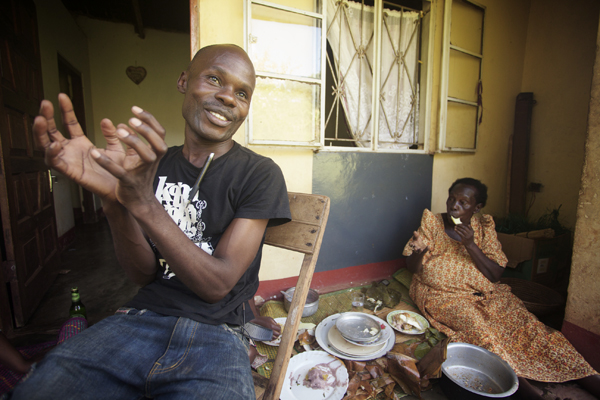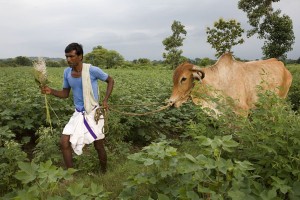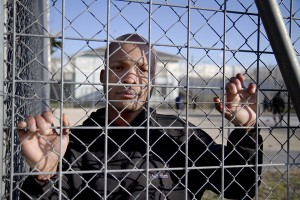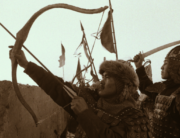
Gay rights activist David Kato with his mother (Human Rights Watch)
Surprising heroes persevere against complicated villains at the 23rd annual Human Rights Watch Film Festival at New York’s Film Society of Lincoln Center. The 16 films from 12 countries are presented around themes and strategies related to the work of the international advocacy organization. Cinematically, the films primarily use two storytelling styles: the struggle of fledgling and experienced journalists to expose truths and poignant portraits that bring life to depressing statistics.
First-time directors Katherine Fairfax Wright and Malika Zouhali-Worrall effectively combine both methods in Call Me Kuchu. They follow two critical years in Uganda’s gay rights movement, which challenged the country’s strict anti-sodomy laws. The charismatic and eloquent David Kato, who discovered the freedom of his sexual identity on a long stay in South Africa, returns in his forties to be the first openly gay man in his home country. He dreams that his family farm could be a safe haven for the gay community, though his confused mother still hopes for grandchildren. Then extreme legislation is proposed that requires the death penalty for HIV-positive gay men and prison for anyone who fails to turn in a homosexual. Their persecutors are conscientiously interviewed, most chillingly the smiling editor of the weekly Rolling Stone tabloid (obviously having nothing to do with the U.S. magazine) that publishes photos and addresses of scores of LGBT individuals under headlines like “Hang Them.” Fire and brimstone American evangelicals are seen preaching against gays to local crowds, but their role and reasons to target Uganda are left murky. While there was international diplomatic and media outrage last year over the murdered gay rights activist, the violence and its aftermath strikes with more horror because the victim is first seen on screen so alive and determined. Although the suspenseful film covers the brave activists’ lawsuit against the newspaper, the festival’s closing night selection is a stark reminder that media crusades aren’t always on the side of human rights.
Other journalists featured are much more idealistic, though they (eerily) have the same crusading fervor. Bernardo Ruiz’s absorbing Reportero profiles Zeta, a Tijuana-based newsweekly, from its founding in 1980 through the threats, wounds, and deaths of editors and reporters as they relentlessly name names in the cartels that traffic in drugs and people. Ride alongs with dedicated reporter Sergio Haro are interspersed with archival interviews and photographs from their investigations that emphasize the terrible toll on civilians of ever more assassinations and revenge killings, including on their own doorstep. The newspaper is also an old-fashioned physical object that moves each week from the (safe) printing press in San Diego to the delivery trucks over the border to the vendors hawking copies on the streets (they say the bloodier cover stories sell more). Airing on PBS’s POV this fall, Ruiz calls the film “a wake” for the reporters who were killed in the pursuit of that truth.

A scene from BITTER SEEDS (Human Rights Watch)
In Bitter Seeds, Manjusha is in high school dreaming of becoming that kind of journalist. She lives in central India at the epicenter of the escalating crisis of indebted farmers committing suicide—including her father—and she believes the story of the impact on their families, like hers, hasn’t been told. A newspaper editor advises her to add balance and documentation to her tales of woe, and her investigation provides a clear explanation of how the catastrophe developed and continues at the village level. She follows her illiterate neighbors over a year through the hard realities of a growing season beset by the vagaries of loans, rain, and infestations. Manjusha’s research is simple but dogged, and her conversations with traditional elders as well as mothers and daughters add to the poignant sense of helplessness.
While Manjusha admirably learns old-fashioned, shoe-leather lessons of journalism, her 22-year-old Cairo counterpart Heba Afify in Mai Iskander’s Words of Witness is so enamored with bringing the 2011 events of Tahrir Square to Twitter and Facebook for the online edition of an independent newspaper that she repeats every rumor and innuendo without either confirming facts or making any effort to talk to anyone she doesn’t already agree with (other than her nervous traditional mother). This documentary makes it look like the Muslim Brotherhood or other Islamists weren’t involved there, unlike Stefano Savona’s more balanced Tahrir.
Beate Arnestad’s Silenced Voices is an admiring, but limited, salute to daring journalists who are exiled from Sri Lanka, and worse, for smuggling out documentation of government suppression of the civilian Tamil minority, including hundreds of thousands who are missing. Unfortunately, the context of President Mahinda Rajapaksa’s bruited victory over separatists’ terrorism is not provided, compared to the director’s more revealing documentary My Daughter the Terrorist (2007).
Portraits of individuals caught up in global issues turn them into accidental heroes. Tim DeChristopher was a wilderness-loving student in Utah concerned about a December 2008 U.S. Bureau of Land Management auction for oil and gas leases in national forests when he was accidentally handed a participant’s paddle to become Bidder 70. Impulsively, he fraudulently outbid others for millions of dollars in drilling rights. While the Obama administration invalidated the leases right after the inauguration, DeChristopher was indicted on federal charges. (The prosecutor’s political or legal reasons for pursuing the case and the judge’s rulings against him are not made clear.) Directors Beth and George Gage follow his maturing political education while he faces the consequences of his actions. He examines the history of civil disobedience and receives advice from those who have gone to jail for their stands, including Vietnam War protestor David Harris.
Getting incidentally caught up in the maw of history also spurs Annie Goldson’s Brother Number One. In 1978, New Zealander Kerry Hamill was seized from his carefree sail boat by the murderously xenophobic (among other disastrous phobias) Khmer Rouge regime. More than 30 years later, his grieving younger brother Rob learns that the Extraordinary Courts of the Chambers of Cambodia and the United Nations permit his testimony at the trial of Comrade Duch, who ran the torturous prison where the lives of Kerry and more than 14,000 Cambodians ended. At first, the film uncomfortably seems too Western-oriented in focusing on one of the few white victims as an entrée into a genocide that engulfed an entire nation, especially in comparison to recent excellent documentaries that already covered some of the same footage and the same witnesses about these crimes against humanity, like in Enemies of the People (2010). But the uniqueness of the brothers’ situations provides a vivid marker to track the horrors of the 1970s and the reconciliation attempts now.
Lieven Corthouts’ Little Heaven spends two years at an Ethiopian orphanage for an intimate, and ultimately hopeful, look at the new faces of the AIDS crisis in Africa. Lydia, the irresistible centerpiece, comes of age at 13 to be informed that she is HIV-positive. She moves to a supportive, cooperatively run dorm for such teens and mainstreamed into an academically rigorous high school in Addis Ababa. Her diary readings provide the emotional context about her broken family and episodes of ill-health, while the camera patiently captures how the kids bolster each other in a shared determination to be optimistic, guided gently by a sympathetic (presumably privately funded) staff.

A detainee in SPECIAL FLIGHT (Human Rights Watch)
Lives hanging in the bureaucratic limbo of Europeans’ classification of refugee or immigrant status are portrayed in a revealing documentary and in a sentimental feature. Director Fernand Melgar’s Special Flight filmed in the no-man’s-land of a model detention center in Switzerland for rejected asylum seekers and migrants. Prejudices against Roma, those from the Balkans, and especially Africans are apparent in even the most well-meaning guards and administrators. The claustrophobic coverage shows that by the time the unwilling are forced onto flights back home, tensions on both sides lead to disturbing violence. German filmmaker Maggie Peren sets Color of the Ocean in and around a more primitive migrants’ detention center on the Canary Islands that abuts tourist resorts. Until the facile ending that posits all we need is guilt-induced love and sympathy for individual people, especially innocent children, to solve this problem of restrictive borders, an appealing and dynamic multinational cast passionately portrays how conflicting motives and trajectories can find humanism at an international crossroads.
Three of the documentaries screening with director Q & A’s deal with such headline-grabbing issues that they have garnered theatrical release later this year: Matthew Heineman and Susan Froemke’s Escape Fire: The Fight to Rescue American Healthcare, Alison Klayman’s Ai Weiwei: Never Sorry about the Chinese activist artist, and Kirby Dick’s The Invisible War on sexual abuse in the U.S. military, which was awarded the festival’s annual Nestor Almendros Award for courage in filmmaking.






Great write-up. I saw Little Heaven today and the director was on hand. It was very sad to learn that Lydia passed away four days ago…